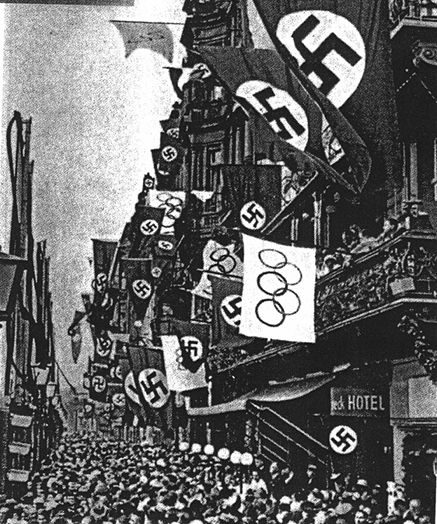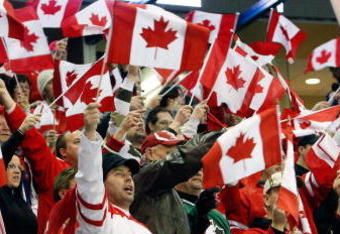Canada's Nazi Olympics
In these Olympics, Canadians only paid attention to Canada
http://www.star-telegram.com/2010/02/28/2003874_p2/in-these-olympics-canadians-only.html
VANCOUVER, British Columbia -- After a spirited torch relay ignited pride in every corner of the country, the Olympic Games began and quickly galvanized the nation.
Flags were everywhere. The country's national symbol hung from windows and was worn on nearly everyone's clothing.
Fervent crowds cheered every victory by the host nation.
But enough about the 1936 Berlin Olympics.
At the opening of these Olympic Winter Games more than two weeks ago, Vancouver organizers expressed the hope that they could show the world a truly "Canadian Games."
That they succeeded in that, there is little doubt.
For 17 days we were barraged with Canadian flags, rode buses and trains with people in sweatshirts and jerseys adorned with Canadian maple leafs, and were serenaded at venues by Canadian spectators, lustily cheering for Canadian athletes.
The first Olympics I ever attended were also in Canada, the 1976 Summer Games in Montreal. For a kid not long out of college, it was a profound experience, seeing Lasse Viren, Alberto Juantorena, Nadia Comaneci-- the athletes of the world -- on the sporting world's grandest stage.
One of the speakers at that Olympics used a phrase that lingers with me still: the family of man.
There is no earthly event that reinforces that notion as well as an Olympic Games. For all of the latter-day Games' inherent commercialism, that ideal persists. I truly believe that.
It persists, despite the overwhelming chauvinism of the past two weeks.
They showed us Canadian Games, all right. And in most cases, nothing but Canadian Games.
I'm not talking about TV coverage. I have no idea what Bob Costas and NBC were televising back in the States.
But from the opening ceremony to Sunday's closing, from the tragic death of Georgian luger Nodar Kumaritashvili to Sunday's gold-medal hockey game, on the streets of Vancouver and at the Olympic venues, only a token nod was given to the rest of the world's athletes.
I was as surprised as I was disappointed.
Had the classic Canadian inferiority complex finally decided to bite back? Or was this a dark consequence of the Own the Podium program?
At the Games' outset, Canada's obsession with finally winning its first gold medal as a host nation was understandable -- quaint, almost.
But that story swiftly swept the luge tragedy off the front pages. There were no follow-up stories about investigations, memorials or retributions to the family.
Kumaritashvili himself was blamed for the fatal accident. The luge competition went on. Some Canadian lugers even callously complained about the shortening of the track.
And so the tone for these Games was set.
It was Canada's party, and no dead luger, no critical British tabloid and no visiting Americans were going to spoil it.
That attitude is regrettable, because a good, if not especially memorable, Olympics followed.
U.S. skier Lindsey Vonn won her cherished gold medal in the women's downhill, validating all the product endorsements and cover shoots she will have between now and 2014.
Evan Lysacek struck a blow for U.S. men's figure skating, giving legendary coach Frank Carroll an Olympic champion for the first time.
Texas-based Olympians fared well, winning five medals, which is as many as Finland, Japan and Italy.
Speedskater Chad Hedrick of Spring earned silver and bronze medals, Denton's Jordan Malone won a relay bronze in short track, and the Dallas Stars' Brenden Morrow (gold) and Jere Lehtinen (bronze) are going home with hockey medals.
But a lot happened that didn't make the front pages of the Vancouver newspapers or find its way into the Canadian TV network's opening montage.
Norway's Marit Bjoergen won three gold medals, a silver and a bronze in cross-country skiing to become the ninth athlete to win five medals at a single Winter Olympics.
Skier Maria Riesch finished in the top 10 in all five Alpine events. Her native country, Germany, won at least one medal on every day of this Winter Olympics.
American short track speedskater Apolo Ohno won three medals, giving him eight and making him the most decorated U.S. Winter Olympian of all time. But that's nothing -- Norway's Ole Einar Bjoerndalen, at age 36, won two biathlon medals and now has 11.
Canada's rush to the victory stand over the Games' final week resulted in a Winter Olympics record for a single nation, 14 total. The U.S. hockey team can take solace that its silver-medal finish Sunday was the Americans' 37th medal, also a record for one nation.
But for the most part, the most underappreciated soul at these Olympics was an American or a European on the medals stand.
Yes, every host nation cheers lustily for its native Olympians. But never in my experience to the extent that we saw here, where the rest of the world's athletes were little more than drink coasters at the party.
South Korean Kim Yu-Na's dazzling gold-medal performance in women's figure skating, for example, was overwhelmed here by the attention given to Quebec's Joannie Rochette, whose mother tragically died.
Chief organizer of the Games, John Furlong, mentioned Kumaritashvili briefly in his Closing Ceremony remarks. But the hosts' insensitivity had long ago been duly noted.
At a news conference Saturday, for example, someone asked Ken Melamed, mayor of Whistler, where the luge run was located, if the village planned some sort of memorial to the luger from Georgia.
Why, yes, the mayor said, "We have to find a way to acknowledge Nodar... and the Canadian athletes that have done well."
See? They don't get it.
The Vancouver Games' ticketing policy didn't help the partisan scene at the venues. To order Olympic tickets through the Vancouver 2010 Web site, a buyer had to have a Canadian address.
China sold 6.8 million tickets to its 2008 Summer Olympics. Vancouver only made 1.6 million available. The Canadians wanted to "Own the Podium," but organizers made sure that they owned the grandstands at each venue as well.
I'm still mystified that Canada fans were able to grab what seemed to be 98 percent of the tickets at the hockey venue. Olympic crowds have always been more inclusive.
In his closing news conference Sunday, IOC president Jacques Rogge acknowledged that there were "teething pains" as the Vancouver Games began.
"There was an extraordinary embrace by the city of Vancouver," he said. "Something I've never seen before."
There was embracing, all right, but then Canadians have always had the reputation for drinking a lot of beer. The loose marijuana laws only added to the nightly revelry in the downtown streets -- which, frankly, seemed to have little to do with the Olympics.
Canada wanted to hold a party, and the Canadians did. The gold medals only seemed to fuel them.
Team Canada hockey jerseys became the uniform of the streets. Maple leafs were either hanging or on clothing everywhere.
One thing I never saw: a simple flag or shirt with the five Olympic rings. Not anywhere. After 15 Olympics, that was a first.
I didn't attend the '36 Olympics, but I've seen the pictures. Swastikas everywhere.
No political reference is meant, just an Olympic one. What on earth were the Canadians thinking?
An Olympic host is supposed to welcome the world. This one was too busy being (their word) "patriotic."
"Now you know us, eh?" chief organizer Furlong said.
We thought we did two weeks ago. Now, I'm wondering if Canadians can even recognize themselves.
Nice party. But so was 1936.

